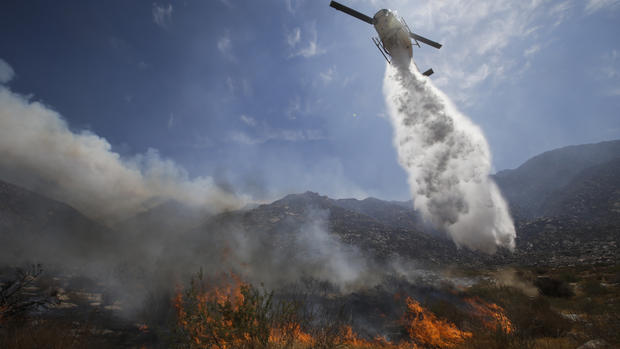Southern California Silver wildfire grows as firefighters make progress
Updated at 2:40 p.m. ET
CABAZON, Calif. Susana Medrano stood in her front yard, mesmerized by the orange and red flames creeping along the wind-swept mountain ridge behind her home, and struggled to leave.
Her children sat in the back of her pickup after grabbing the new clothes and backpacks they had bought for the school year, which starts next week. Now they were wondering whether they would have a place to live.
"It's hard because we don't know what's going to happen," the mother of four said Thursday, her eyes tearing up as she prepared to stay with family down the road in San Bernardino. "I've never seen the fire so close to my home."
The wildfire burning 90 miles east of Los Angeles in the San Jacinto Mountains since Wednesday has destroyed 26 homes and threatened more than 500 other residences, forcing some 1,800 people to flee.
The fire grew by 2,000 acres to 25 square miles overnight but it was significantly less active Friday morning. Evacuations of a handful of communities remained in effect, however, as a safety precaution, said fire spokesman Eric Solomon.
Firefighters expected to contain more of the fire Friday, but stronger winds were also expected to make the fire more unpredictable, CBS News correspondent Ben Tracy reported on "CBS This Morning" Friday from Whitewater, Calif.
With rugged terrain, dry conditions and steady winds, crews have had to fight the fire with fire, Tracy reports. They have intentionally lit massive backfires on hillsides to create larger containment lines.
Some 1,600 firefighters were on the lines, and seven retardant-dropping tankers joined eight helicopters in what Solomon termed a "very strong attack on this fire from the air."
The injury total remained six: one civilian with serious burns and five firefighters whose injuries included heat exhaustion.
Firefighters focused protection Friday on the tiny community of Snow Creek, a shift from a day earlier when the threat appeared aimed at portions of the city of Cabazon.
CBS News correspondent Bigad Shaban reported from Snow Creek that firefighters there said the wildfire was one of the fastest moving they've seen in 50 years.
"This fire - burning not under Santa Ana conditions but burning under a west wind - was one of the most quickly spreading, rapidly spreading, dangerous fires that I've seen," Riverside County Fire Chief John Hawkins said.
Medrano was among scores of residents in Cabazon who were evacuated in the pre-dawn hours Thursday and returned after sunrise to pack up more belongings and watch the flickering line of fire snaking along the brown, scrubby mountains.
In the nearby town of Banning, Lili Arroyo, 83, left with only her pet cockatiel, Tootsie, in its cage and a bag of important papers from her home, which was rebuilt after being destroyed in a 2006 wildfire.
"There were embers and ash coming down all over the sky," Arroyo said. "The smoke was really thick. I was starting not to be able to breathe."
Along with Cabazon, the evacuation orders covered the rural communities of Poppet Flats, Twin Pines, Edna Valley and Vista Grande, and several camping and hiking areas.
Most of Southern California's severe wildfires are associated with Santa Ana winds caused by high pressure over the West that sends a clockwise flow of air rushing down into the region.
This week's fire, however, was being fanned by a counter-clockwise flow around a low pressure area over northwest California. But the National Weather Service said Friday conditions could change in the second half of next week, with weaker winds in the mountains and deserts.
It was the second major wildfire in the San Jacinto Mountains this summer. A blaze that erupted in mid-July spread over 43 square miles on peaks above Palm Springs, burned seven homes and forced 6,000 people out of Idyllwild and neighboring towns.
The latest fire also burned in the footprint of the notorious Esperanza Fire, a 2006, wind-driven inferno that overran a U.S. Forest Service engine crew. All five crew members died. A man was convicted of setting the fire and sentenced to death.
After touring the area, U.S. Sen. Barbara Boxer, D-Calif., who lives in Riverside County, said 165,000 acres have burned in California this year and climate change is setting conditions for more disastrous blazes, while budget cuts are limiting resources to fight them.
"Unless we take action, things are only going to get worse," she said.
A different blaze, a 60-acre wildfire, forced evacuations of about 75 homes Thursday near Wrightwood, a community in the San Gabriel Mountains popular with skiers located about 40 miles northeast of downtown Los Angeles.
